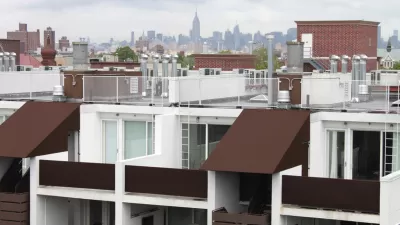Two authors agree that housing policies in the War on Poverty have failed. Are those policies too progressive, or not progressive enough?

Earlier this month, progressive Maya Dukasmova provided a critique of the "liberal establishment’s" well-intentioned but circular and racist housing policies designed to address urban poverty.
"When we blame 'concentrated poverty' for the diminished quality of life in minority neighborhoods, we are confusing that which creates poverty (namely racist policies and practices) and the conditions created by it..housing mobility efforts, while beneficial for some individuals, only affirm the notion that there is something inherently wrong with black communities..."
Free-market enthusiast Emily Washington responded with her own interpretation of the causes of failure. While Washington agrees that government efforts to "achieve the 'correct' mix of income diversification" are ill-conceived, she blames progressives. "In fact, the programs that she [Dukasmova] criticizes directly grew out of progressive scholarship and politics."
While both writers point to the seminal work of photographer Joseph Riis’ documentation of living conditions in New York City’s 19th-century tenement housing, they disagree on the political repercussions of his influence.
Dukasmova: "In the decades after it first glimpsed this urban poverty in Riis’s photographs, the establishment watched as metropolitan areas around the country grew ever more segregated…Part of the liberal establishment’s failure to address this problem stems from its inability to embrace truly progressive understandings of poverty."
Washington: "Jacob Riis’ influential work...fueled a progressive movement to eradicate tenement housing, with activists motivated both by altruism toward the poor and by a fear of disease and cultural changes that immigrant-dominated neighborhoods brought."
Dukasmova believes that a truly progressive policy would reframe the conditions of the urban poor in terms of the impact of "concentrated power, concentrated whiteness, and concentrated wealth." Washington has a very specific policy recommendation: she believes that unconditional cash transfers to the urban poor would be more effective than government-engineered mobility because unconditional transfers "do not disrespect the autonomy and ability of people of all income levels to make decisions that benefit their own interest."
FULL STORY: The history of progressive housing policy

Alabama: Trump Terminates Settlements for Black Communities Harmed By Raw Sewage
Trump deemed the landmark civil rights agreement “illegal DEI and environmental justice policy.”

Planetizen Federal Action Tracker
A weekly monitor of how Trump’s orders and actions are impacting planners and planning in America.

Why Should We Subsidize Public Transportation?
Many public transit agencies face financial stress due to rising costs, declining fare revenue, and declining subsidies. Transit advocates must provide a strong business case for increasing public transit funding.

Understanding Road Diets
An explainer from Momentum highlights the advantages of reducing vehicle lanes in favor of more bike, transit, and pedestrian infrastructure.

New California Law Regulates Warehouse Pollution
A new law tightens building and emissions regulations for large distribution warehouses to mitigate air pollution and traffic in surrounding communities.

Phoenix Announces Opening Date for Light Rail Extension
The South Central extension will connect South Phoenix to downtown and other major hubs starting on June 7.
Urban Design for Planners 1: Software Tools
This six-course series explores essential urban design concepts using open source software and equips planners with the tools they need to participate fully in the urban design process.
Planning for Universal Design
Learn the tools for implementing Universal Design in planning regulations.
Caltrans
Smith Gee Studio
Institute for Housing and Urban Development Studies (IHS)
City of Grandview
Harvard GSD Executive Education
Toledo-Lucas County Plan Commissions
Salt Lake City
NYU Wagner Graduate School of Public Service





























